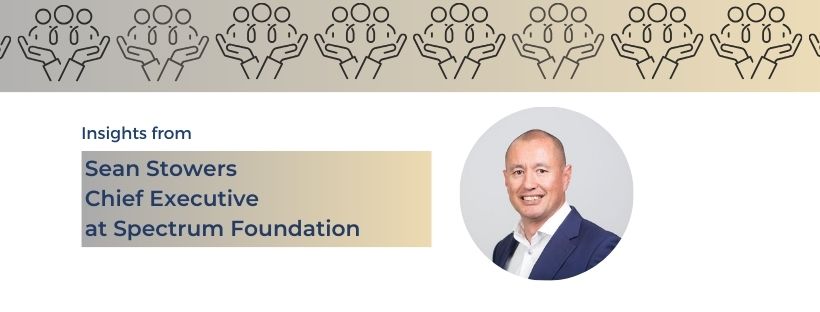Sean Stowers, Leading Together: Tackling complex challenges through Cross-Sectorial collaboration
30 Aug 2023

This month, we had the privilege of speaking with Sean Stowers, the Chief Executive of Spectrum Foundation in New Zealand focused on service delivery, community housing and philanthropy in the disability sector.
In this insightful interview, Sean shares his perspective on the need for cross-sectorial collaboration to address the inequity experienced by tāngata whaikaha.
- What are some of the major intersectoral challenges your organisation is facing?
The major intersectoral challenges faced by Spectrum Foundation Group relate to the complexities of the key domains that need to be in place for a disabled person and their whānau to live a life of their choosing. These domains include affordable and accessible housing, access to education and employment opportunities, a health system that recognises the inequities of health outcomes for disabled people and is designed accordingly to address these, and self-determination that has disabled people and whānau in the driver’s seat. Across these domains people with a disability who are also Māori or Pasifika face greater inequities.
As a result of the above complexities, intersectoral challenges can include cross-sector collaboration with the coordination of healthcare, education, employment and social service supports to be aligned and in place to achieve sustainable and equitable outcomes. The more obvious funding silos can exist across sectors making it difficult to have a seamless support experience as disabled people move through those important transitions in their life. Access and the sharing of information becomes critical in determining support requirements, planning and funding as does varying levels of awareness and understanding of the many disabling factors present in our communities that have significant impacts on disabled people and their whānau.
- Is there an example of cross-sectoral collaboration you are part of that is directly benefiting your clients?
Spectrum Foundation Group is currently undertaking a significant cross-sectoral joint venture, called the JVBU Safeguarding Project, which involves implementation of a Safeguarding Framework to promote and protect disabled people’s rights, culture, safety and wellbeing.
The project has involved a partnership between Spectrum Foundation and its two companies Spectrum Care and Homes of Choice, the Safeguarding Adults From Abuse (SAFA) Collective, Waitematā District Health Board and the Waitematā District Police.
The framework will help build capacity for an integrated, community-led approach, develop a shared understanding of the dynamics of abuse, and implement a systematic response when it occurs.
The purpose of the collaboration is to provide recommendations to government around the prevention of abuse, neglect and harm of Tāngata Whaikaha Māori, deaf and disabled people, adults at risk, family and whānau.
Spectrum Foundation’s direct contributions have been to examine current processes that support a safeguarding culture and practice; establish pathways towards a greater safeguarding culture and services; and evaluate the project’s impacts on customers, staff and funders.
This has included providing valuable information that can be utilised by other providers of disability related services to help embed a safeguarding framework, as well as establish a twin-track response to the abuse, harm and neglect of adults.
Spectrum Foundation saw this as a prime opportunity to collaborate across sector boundaries and play a part in the safeguarding of adults space.
- What leadership capabilities are required successful navigate cross-sectoral collaboration?
While I am sure there are a number of leadership capabilities for successful cross-sectoral collaboration there are a handful that appear relevant to be successful.
The first is understanding how sectors interact and influence in order to be able to identify opportunities and risk. From here there is the need for collaborating partners having an agreed and shared commitment with leaders who can establish clear and cohesive mandates for engagement.
Customer communities must support the collaboration. Leaders must be able to balance organisation/sector imperatives with those of all key customer communities and, ideally, engage those communities in decision-making.
Capacity must be either in place or under development. A leader must be able to ensure all required resources – people or otherwise – are available, effective and sustainable to ensure success.
Trusted relationships are key. Leaders must be able to develop and enhance relationships that are founded on trust, transparency and mutual benefit. The quote “We travel at the speed of trust” comes to mind here.
Overall a ‘picture of success’ is critical. A leader must be able to establish and effectively share a cohesive understanding of what success looks like in order for all parties, resources, planning and customer communities to not only participate in the journey, but arrive together at the destination…

